





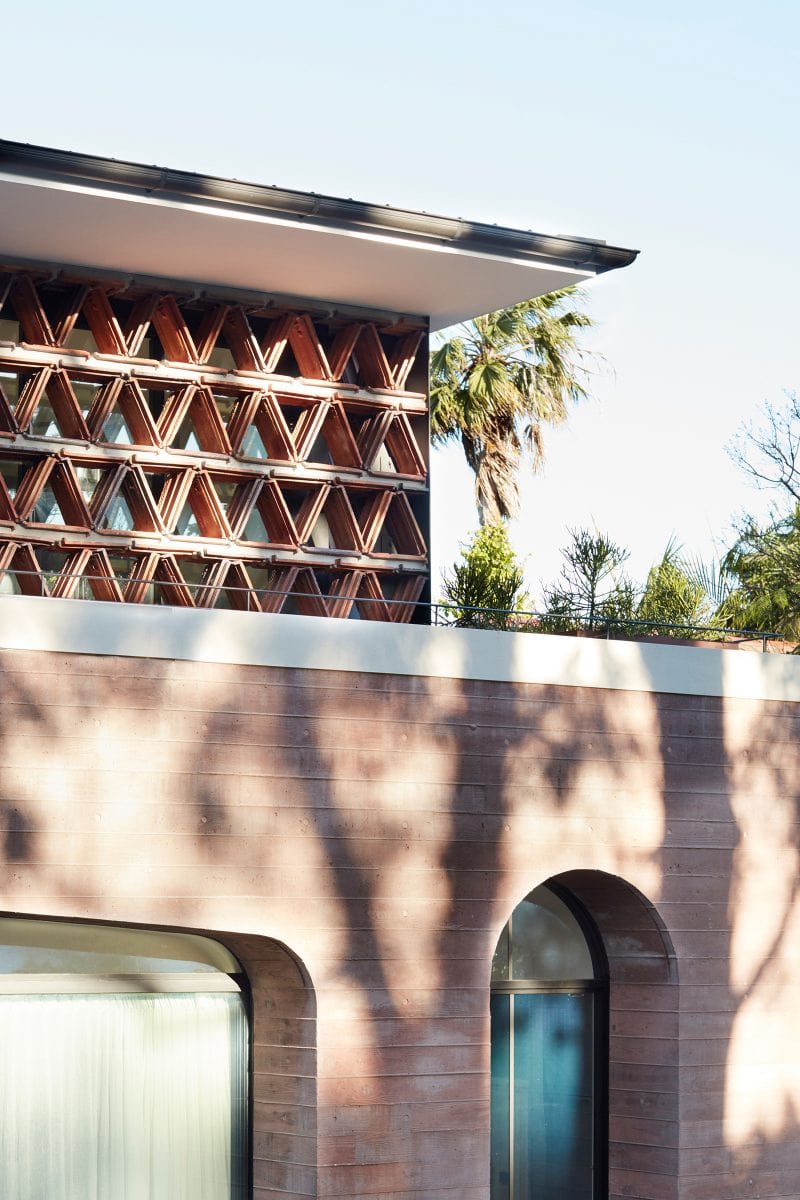
La Casa Rosa
Under the reign of Queen Victoria, the residential architecture of the British colonies was immersed in a nostalgic and late romantic borrowing of gothic architecture in its idealised interpretations of John Ruskin’s essay, The Seven Lamps of Architecture1, where the skill and craft of the builder was more important than the architect’s conceptualisation. Lacework, fretwork, intricate plaster detailing and elaborate timberwork were the currency of the Victorian colonial home.
In a modest way this home in the Sydney beachside suburb of Bronte possessed many of the traits of that late Victorian style, and when called upon to provide it with a new lease of life, for Luigi it brought to mind a holiday villa of his childhood, located on a hilltop overlooking Lago Maggiore (Italy) and named La Casa Rosa for its washed pink render.
In true Victorian neogothic spirit we gathered together a team highly skilled in their respective crafts: Will Dangar oversaw the landscaping, aided by his creative stonemason, Nazih; Juliette Arent and Genevieve Hromas of Arent & Pyke brought their love of intricate detail and the input of her talented team; Callum Coombe lent his skill in forming a brise soleil of otherwise redundant terracotta roof tiles that he first honed in the construction of The Beehive2; Buildability Constructions assembled a crew of fine carpenters and formworkers; and we must not forget the amazing Stiven of Sydney Joinery, whose refined joinery is an integral feature of every room, together with the Architecture Stone Concept’s stonemasonry.
Craftiest of all was our Client, whose brief did not simply seek to replace later additions to the rear of the property and provide a new main living space and a master bedroom suite and study in the first floor additions, but who challenged us to provide their family with a home that fitted their dreams and ambitions. Every aspect of the house is now a depiction of their aspirations; their Le Vie en Rose3 perception of the world.
There was no wastage in this project. The house is not large; there are no unnecessary rooms; no unnecessary gadgetry. We made no alterations to the existing rooms at the front of the original house, and the new additions to the rear are well proportioned in relation to that structure. We retained the existing 1980s pool and preserved the dense backyard vegetation. We recycled the roof tiles to construct the brise soleil and would have retained the terracotta roof tiles to the front of the house had the roofer not been so zealous in convincing the client to replace them. We used second-hand timber windows to the Victorian front façade and specified the reuse or recycling of demolition materials. This house is air conditioning free; instead ceiling fans are employed for mechanical cooling in combination with good insulation, large eaves, and sun shading to all windows; trees and water help to cool the backyard space. Through the short winter months heating is provided by hydronic panels.
The new structure to the rear of the property is constructed in pink concrete, achieved by adding a mineral pigment to the whole thickness of the material. The name of the pigment, ‘Flamingo’ fits well with the two concrete feet on the ground and long cantilevered neck of the rear elevation. For Luigi, La Casa Rosa holds many happy memories his ‘young age’, hopefully La Nuova Casa Rosa will hold similar joys for the two young children who will grow up there.
Further Reading
1. The Seven Lamps of Architecture, John Ruskin
2. The Beehive
3. Le Vie En Rose
Location: Bronte, NSW
Council: Waverley Municipal Council
Design Architect: Luigi Rosselli
Project Architects: Carl Rutherfoord, Daniel Nunez
Landscape Architect: William Dangar for Dangar Barin Smith
Structural Consultant: Geoff Nines Fong & Partners
Interior Designer: Arent & Pyke
Builder: Buildability Constructions
Brise Soleil: Callum Coombe
Joiner: Sydney Joinery
Stonemason: Nazih for Dasreef Pty Ltd
Photography: Prue Ruscoe
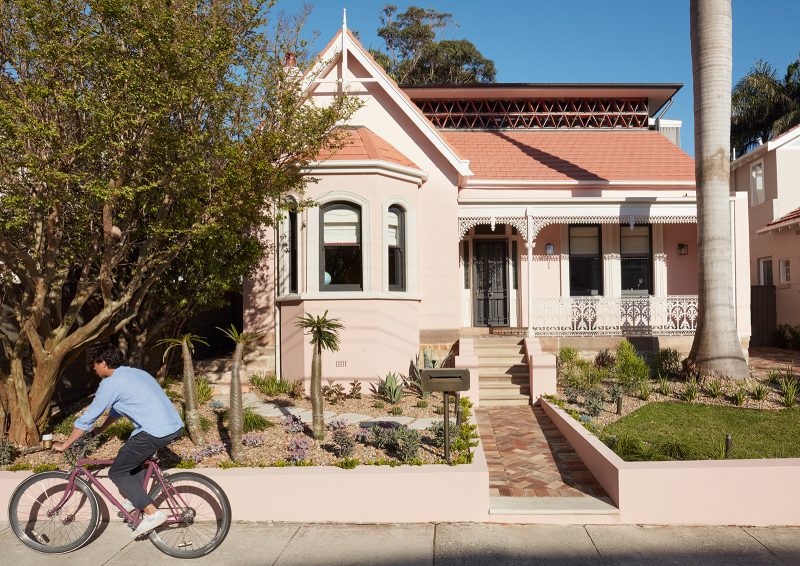
The neogothic Victorian cottage, with its original cast iron work. The first-floor addition hovers over the roof ridge and showcases a glimpse of the brise soleil constructed using repurposed terracotta roof tiles that screens the morning sun.
In the foreground one can see the Luigi Rosselli Architects designed letterbox supplied by Robert Plumb.
© Prue Ruscoe
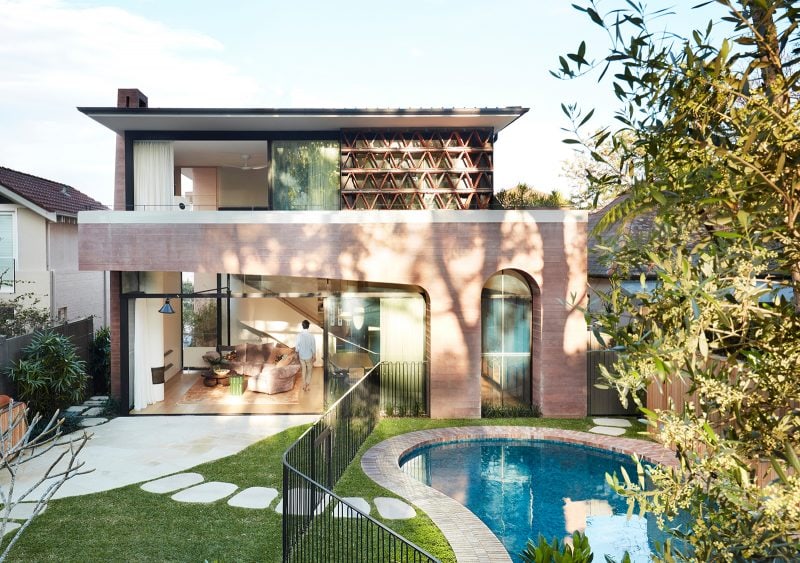
To the rear of the house, beside the original 1980s swimming pool, a ‘Flamingo’ tinged concrete wall cantilevers towards the sun. The windows of the first-floor addition catch the soft light dappled by the garden’s trees and filtered by the brise soleil.
© Prue Ruscoe
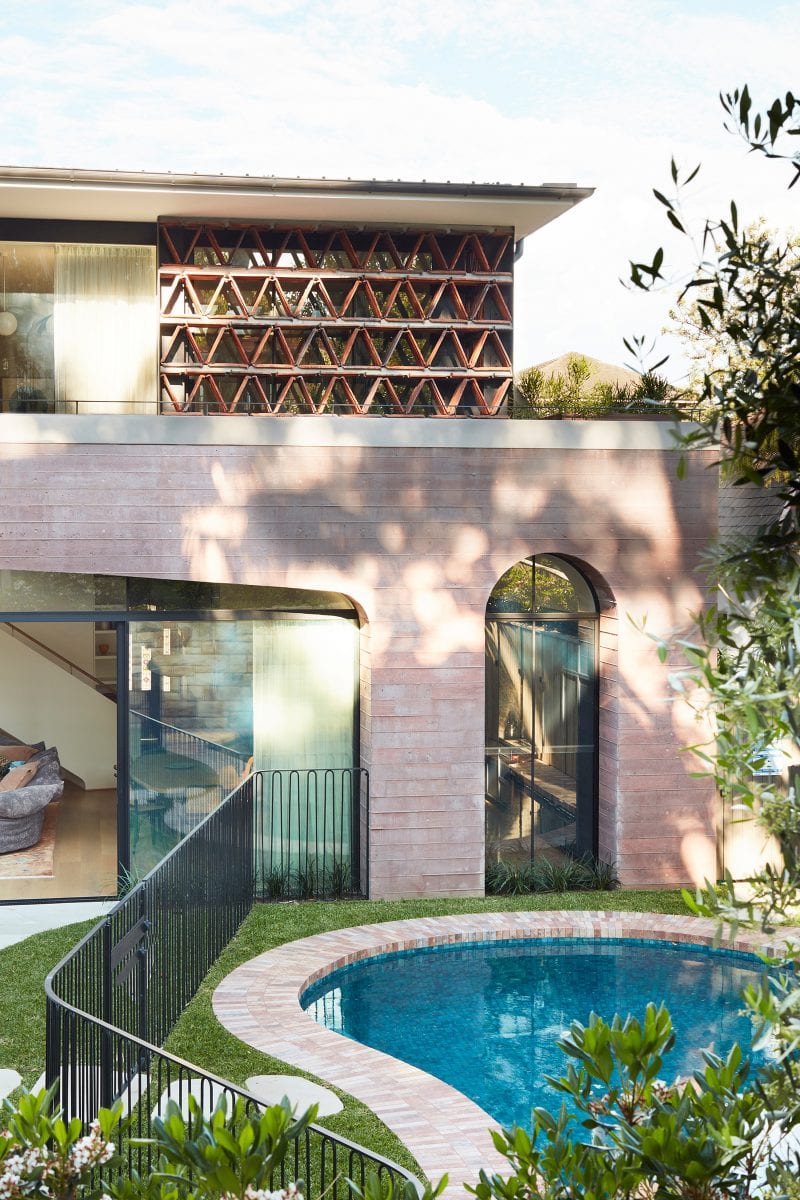
The cantilevered concrete structure was formed using recycled timber boards allowing for the reading of the grain and the edges of the timber boards.
© Prue Ruscoe
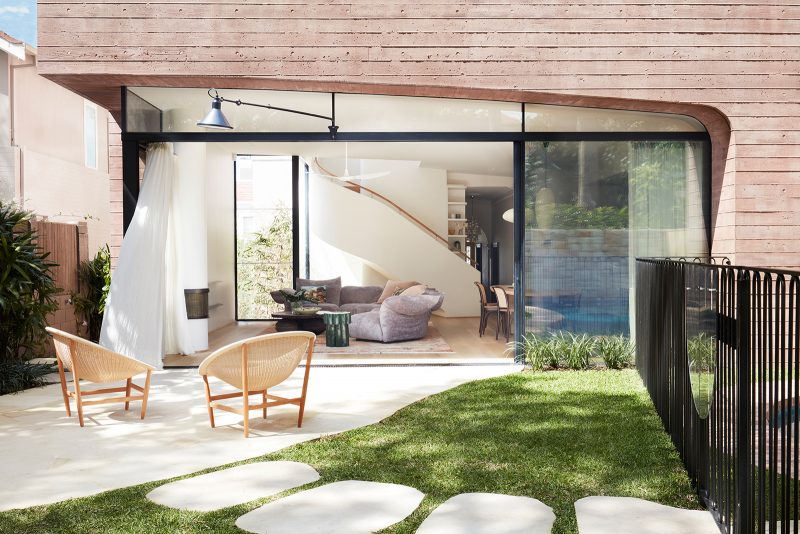
Vitrosca slimline windows revealing the easy flow from the interior to the garden. The Outdoor Seaside lamp by Lampe Gras reaches out to the external sitting area.
© Prue Ruscoe
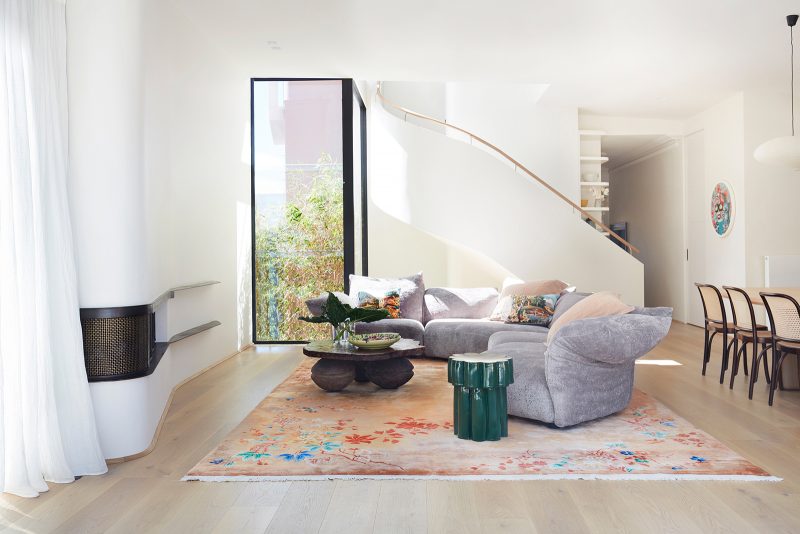
Arent & Pyke’s happy colour palettes enlivens the main living spaces; here with an EDRA sofa on a 1st Dibs rug with ceramic side table and burr wood antique table.
© Prue Ruscoe
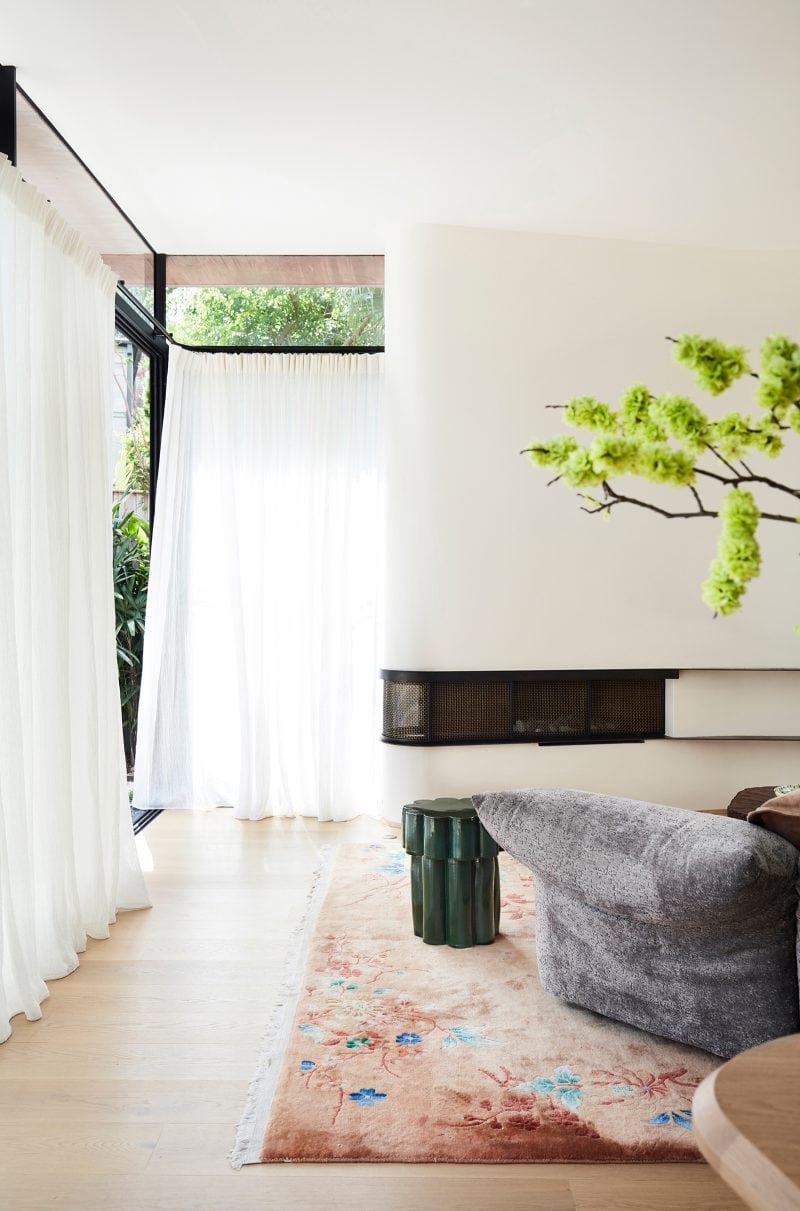
A Jetmaster Horizon Cantilever gas fireplace is screened by a brass flat bar mesh on a discrete sliding track.
Curtains by Simple Studio
© Prue Ruscoe
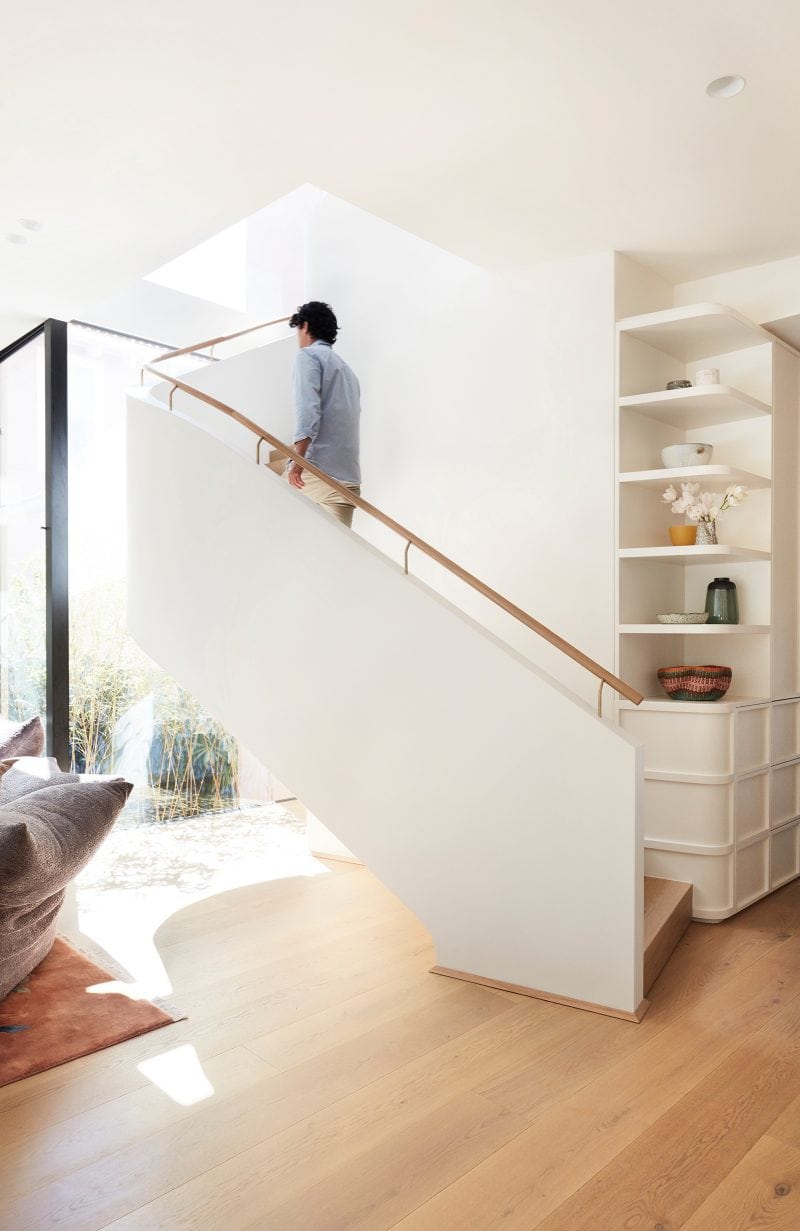
A pulpit-like stair dominates the sitting room and allows the morning sun to flow into the main living area.
© Prue Ruscoe

The master bathroom is screened by the brise soleil and the trees in the garden. The screen was originally designed by Raffaello Rosselli for the new Luigi Rosselli Architects studio HQ
© Prue Ruscoe
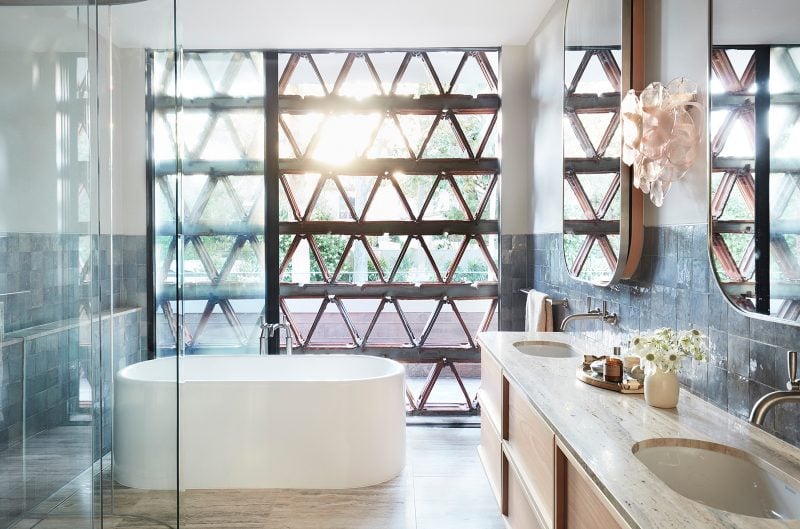
Callum Coombe is the skilled architect and hands on builder who constructed recycled tile screen. Grey travertine brings a little of the Roman countryside to Bronte. All joinery was designed by Luigi Rosselli Architects with input from Arent & Pyke regarding appearance and material choices.
© Prue Ruscoe
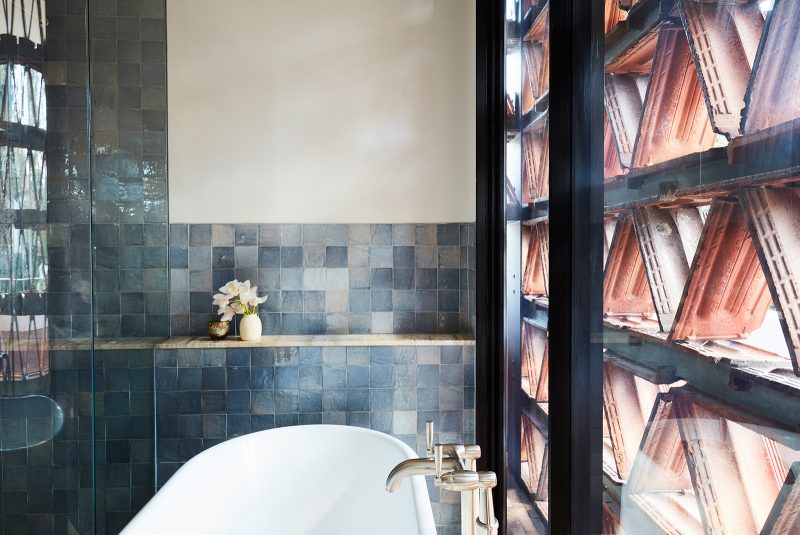
Handmade tiles, made in the post-industrial era, are a reminder are a reminder of the value of toil and labour creativity.
© Prue Ruscoe
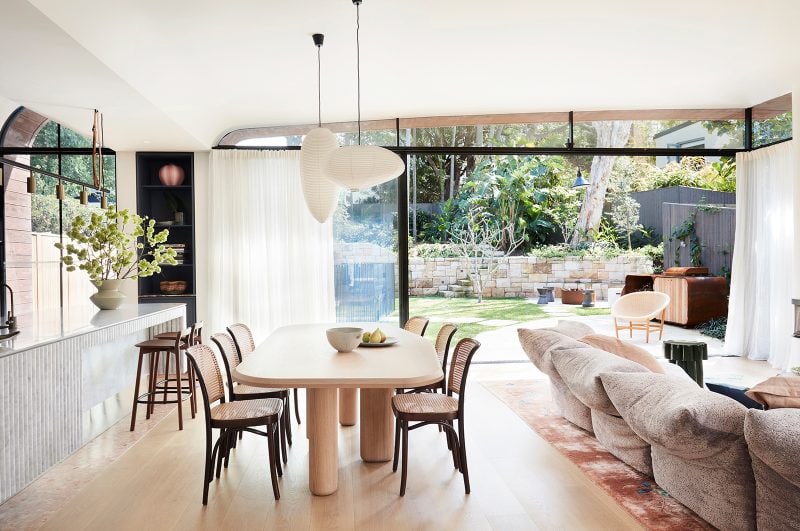
Designed in the 1920s by Austrian architects Josef Hoffmann and Josef Frank, the ‘Prague’ chair, made by Thonet is a collector’s item. Paired with a very ‘chique’ Christophe Delecourt table, are good conversational pieces to discuss over breakfast.
© Prue Ruscoe
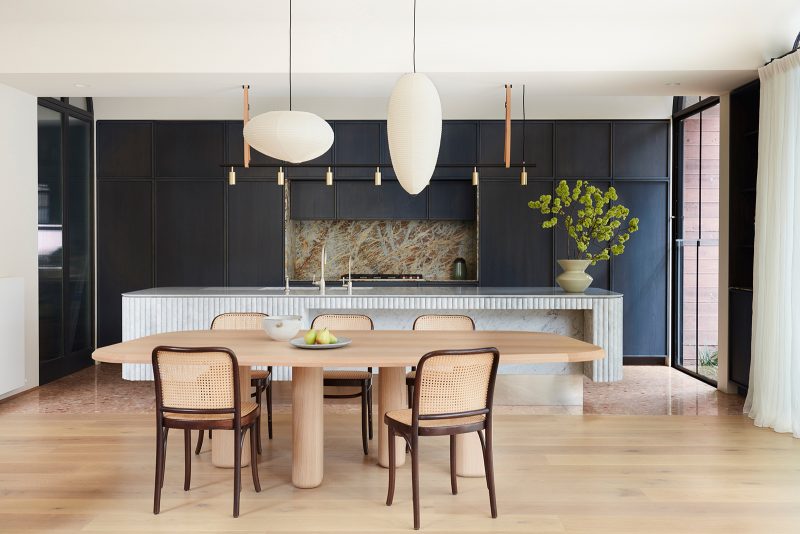
Gustov Mahler would have appreciated the profound and dramatic colour of this kitchen joinery wall, brought into being by the hard toil and labour of Sydney Joinery and Architecture Stone Concept stonework.
© Prue Ruscoe
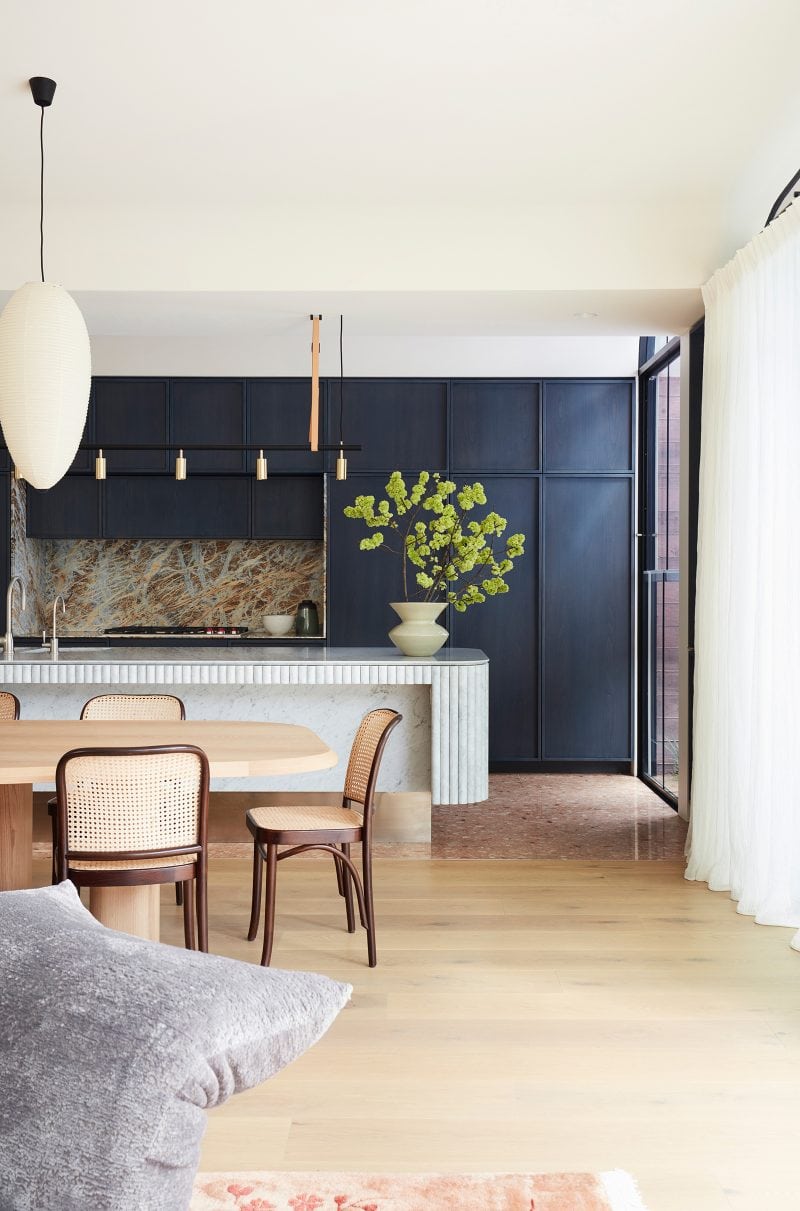
© Prue Ruscoe
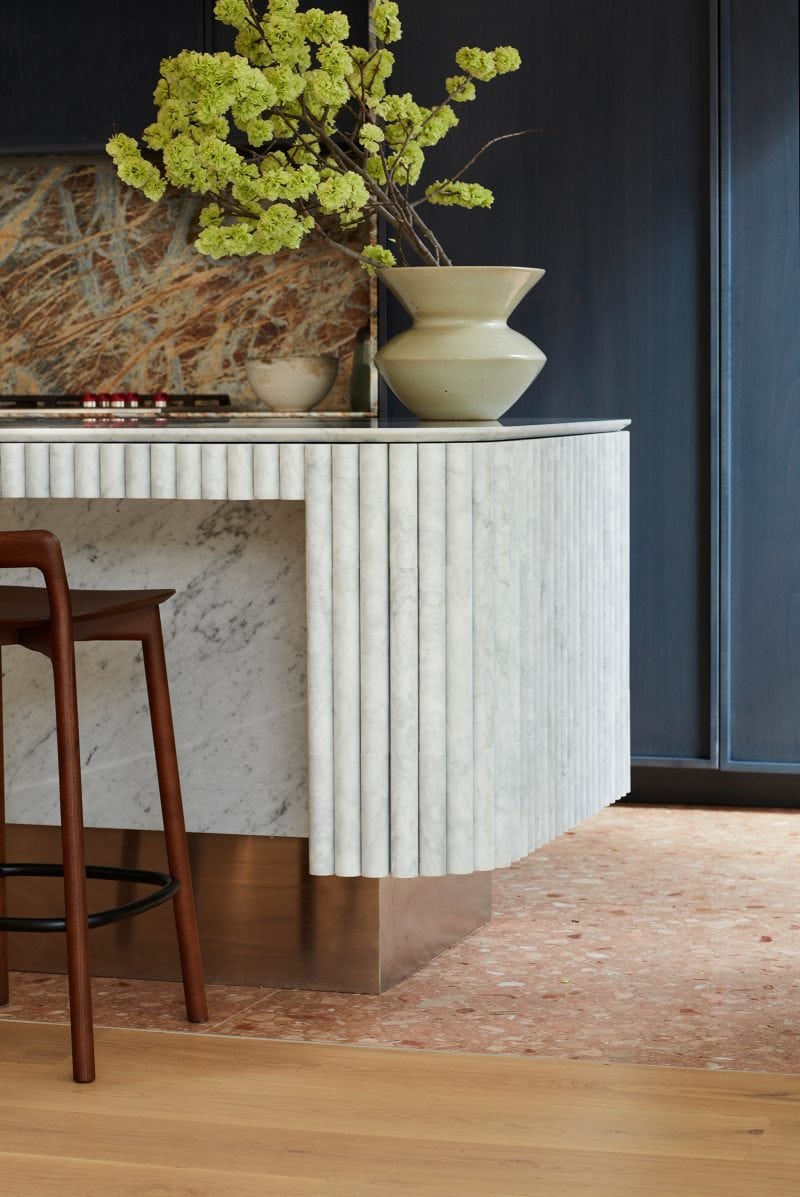
Carrara ‘shark nose’ benchtop and vertical fillets by Skheme.
© Prue Ruscoe
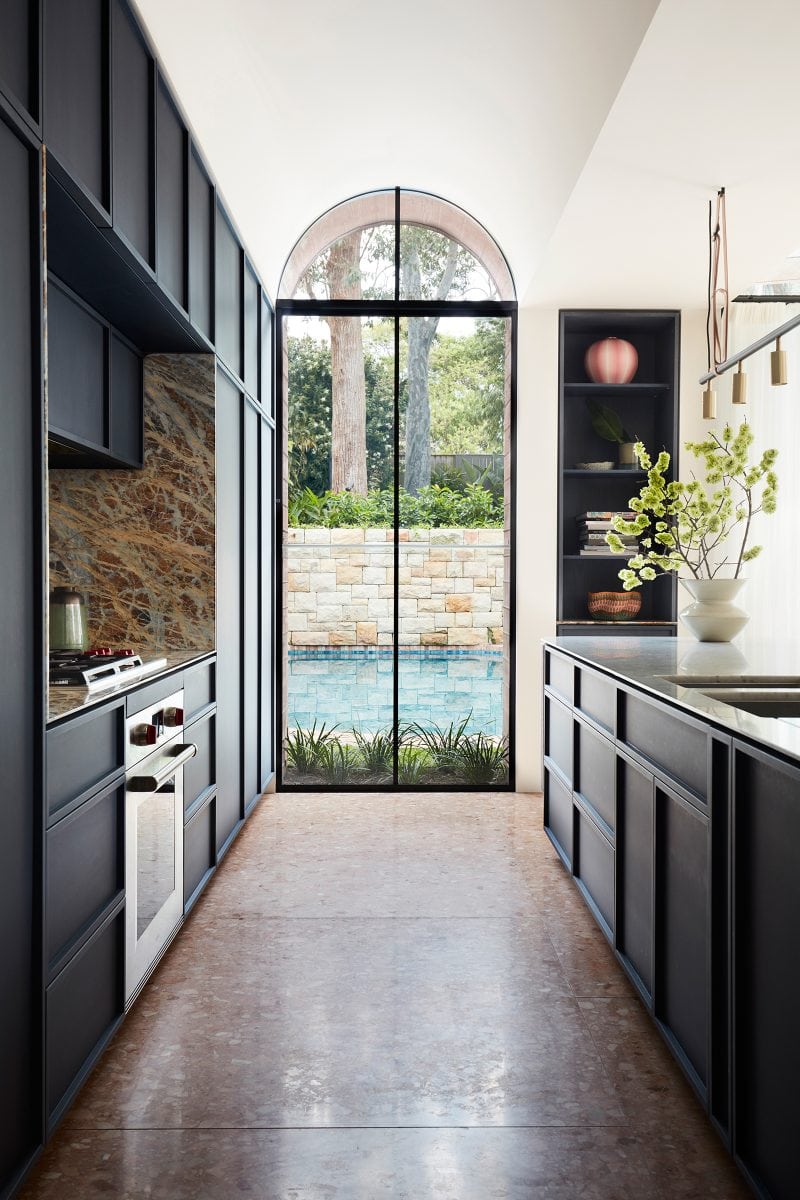
Beautifully made joinery and stone tempers the appearance of the clunky, Midwestern USA designed, Wolf stoves.
© Prue Ruscoe
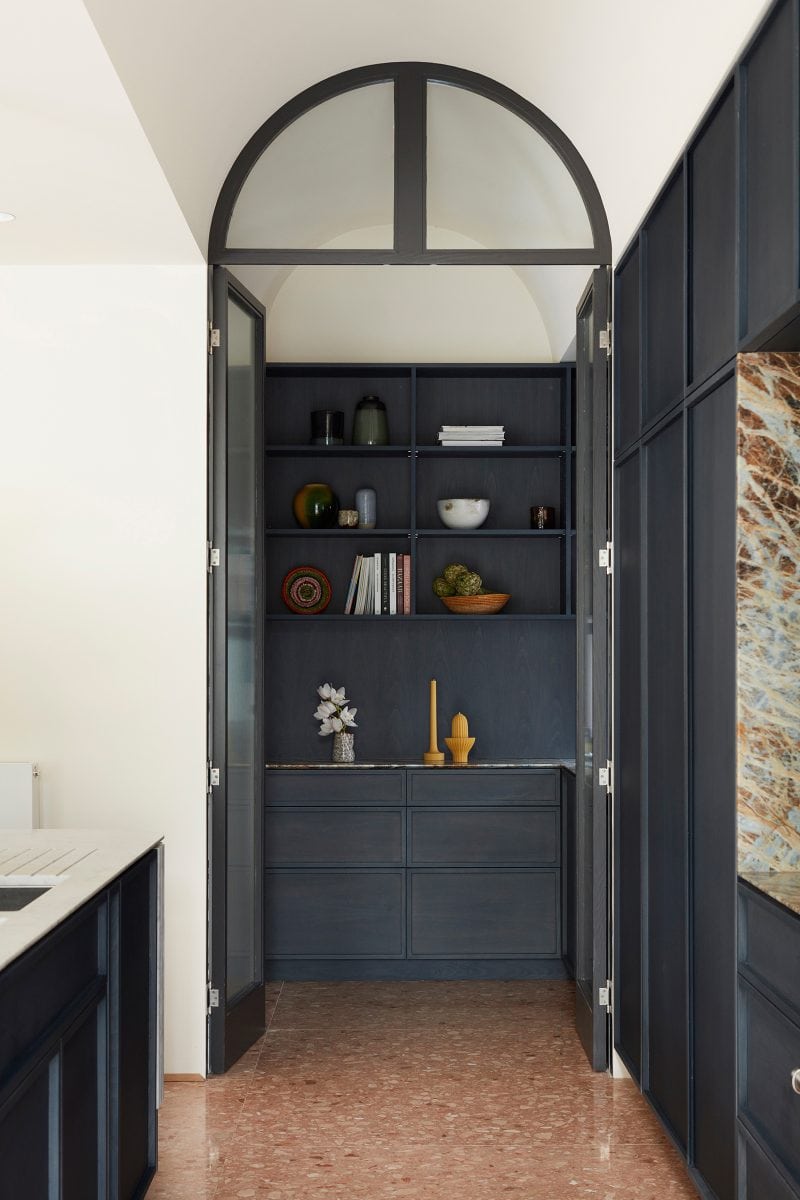
Is this a pantry or a ‘temple’ to design? Real life reappropriated this space following the photo shoot.
© Prue Ruscoe
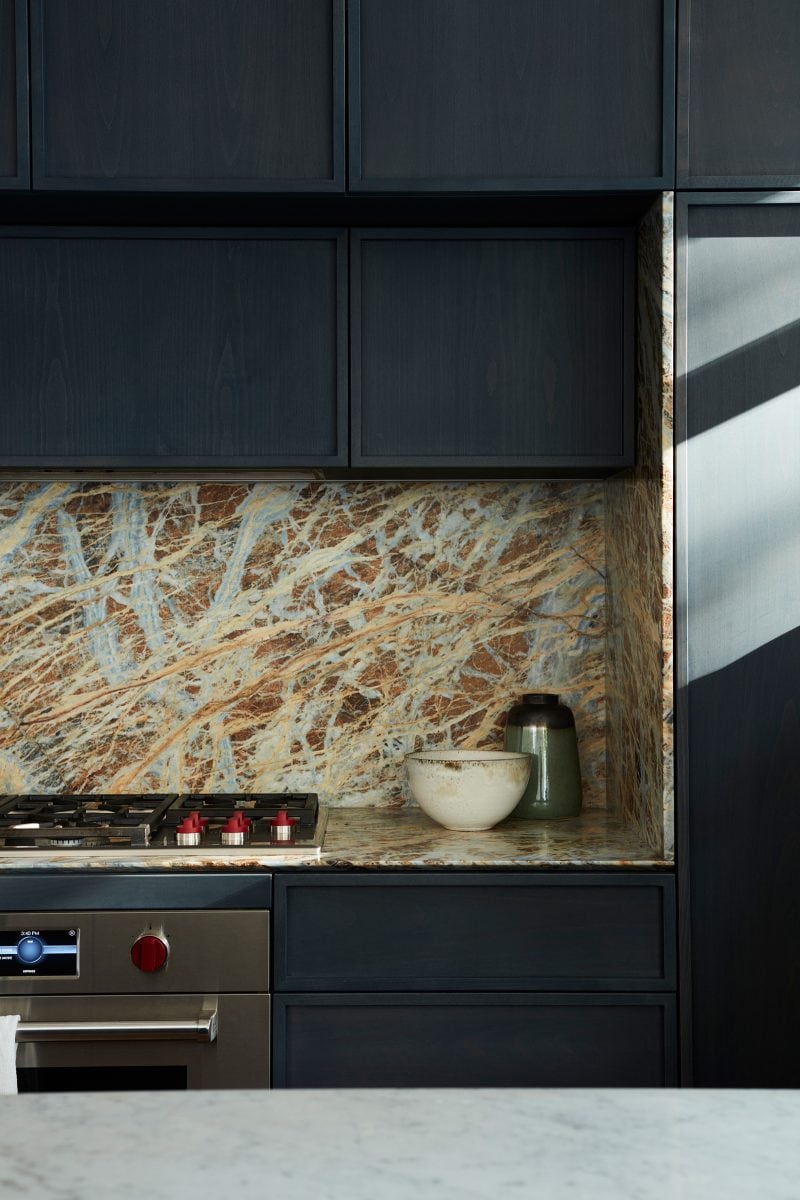
Blue Dreams stone by Euromarble.
© Prue Ruscoe
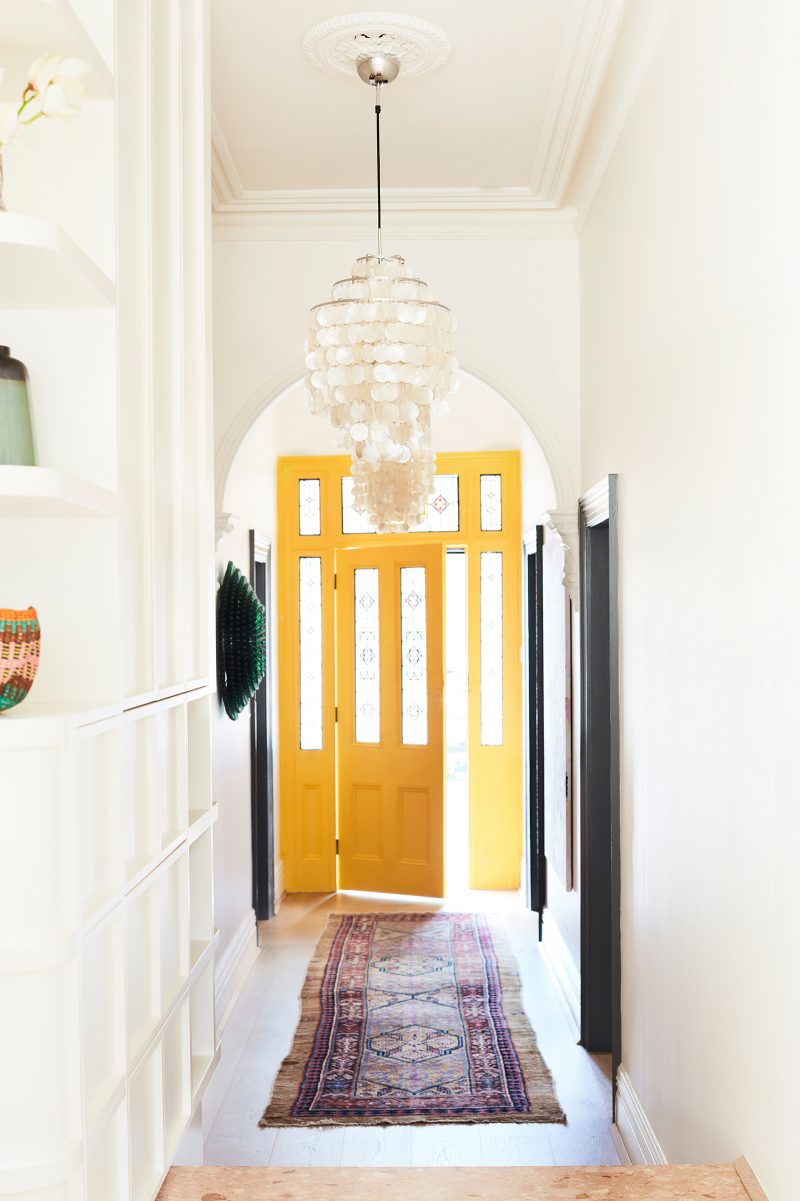
Porter’s Paints ‘Yellow Taxi’ paint brightens up the original front door of the home.
© Prue Ruscoe
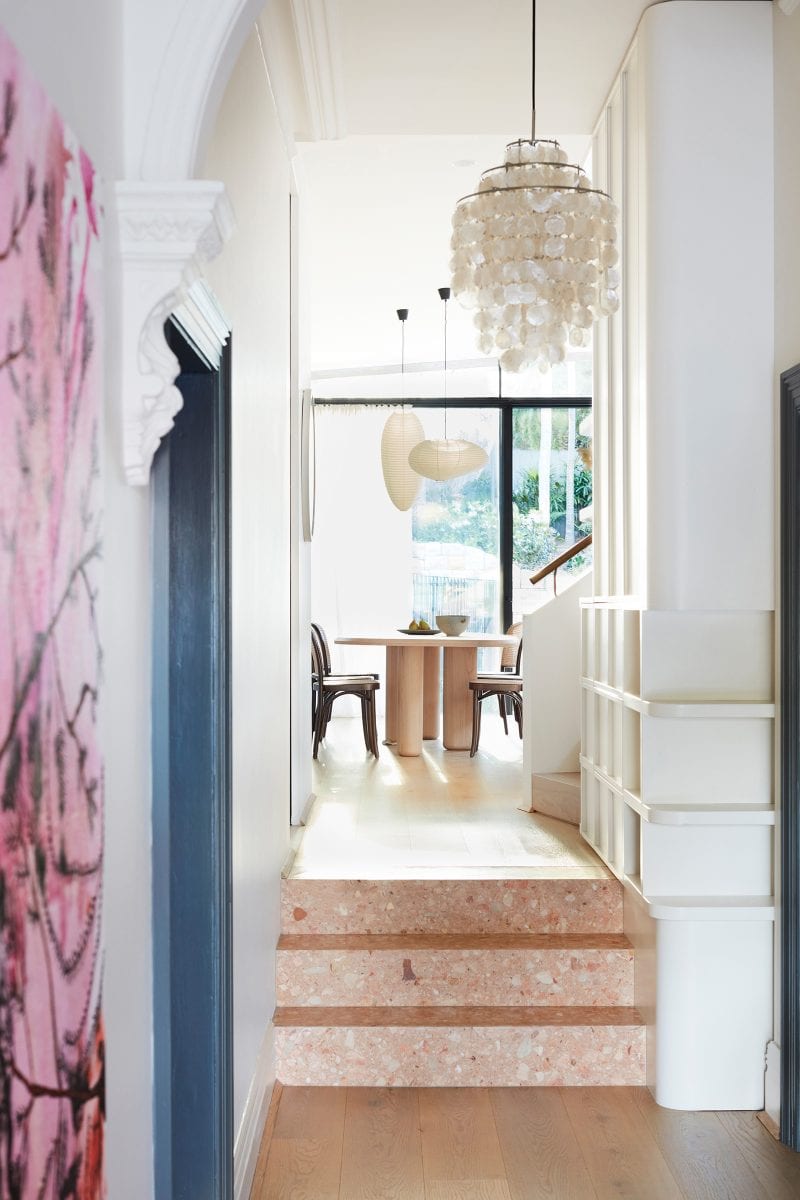
© Prue Ruscoe
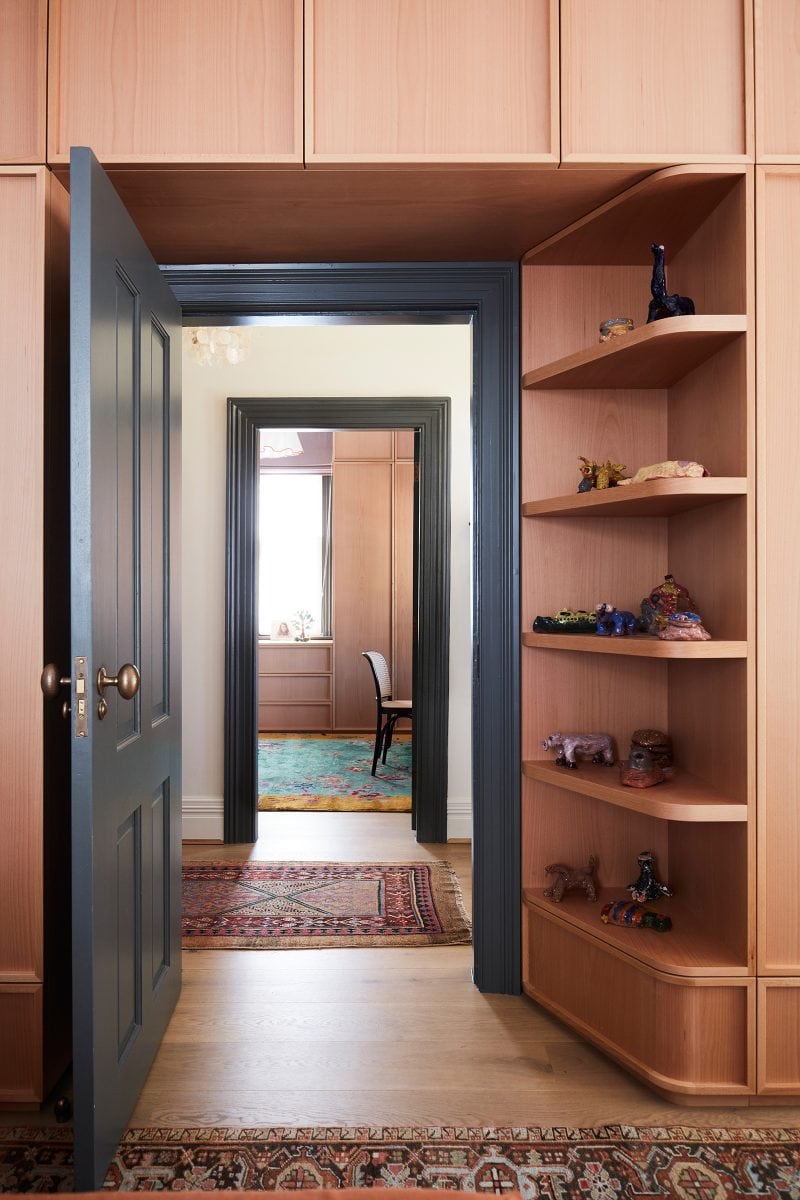
Dark timberwork doors serve as a backdrop of the beautiful natural beech veneer of the joinery.
© Prue Ruscoe
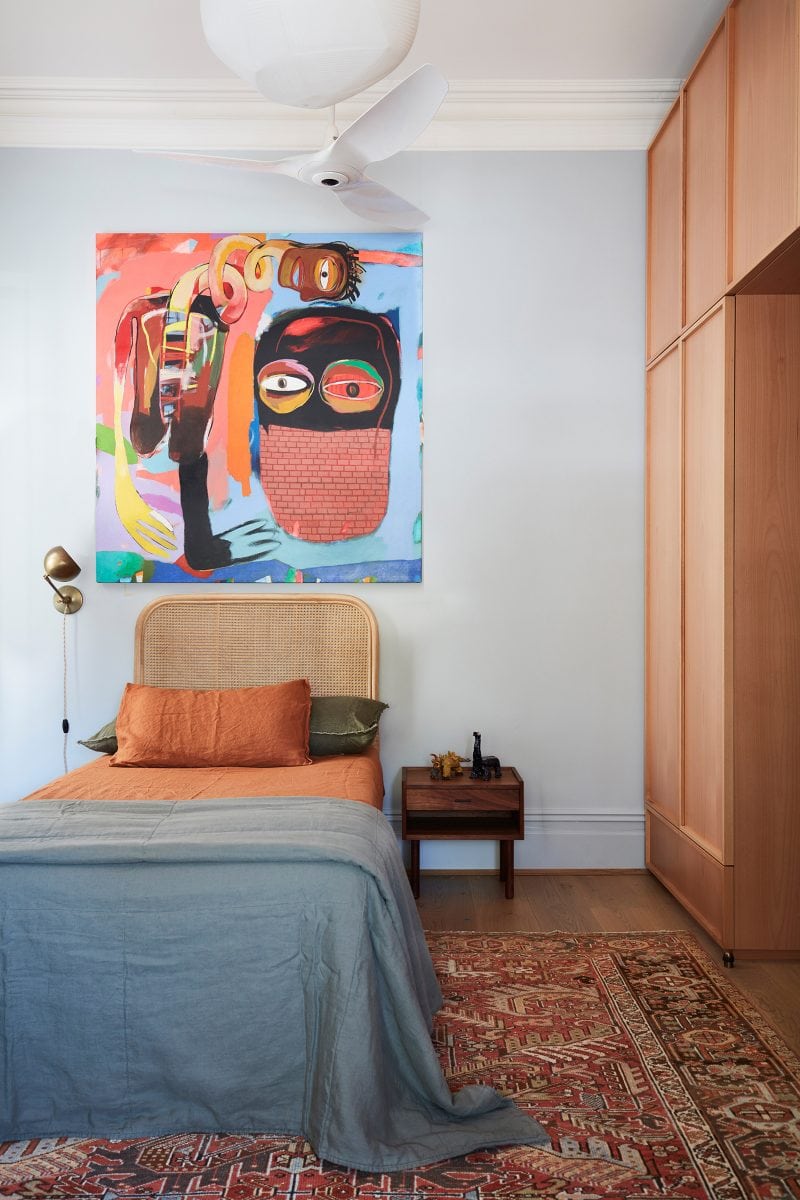
Artwork by Vajira Gunawardena.
© Prue Ruscoe
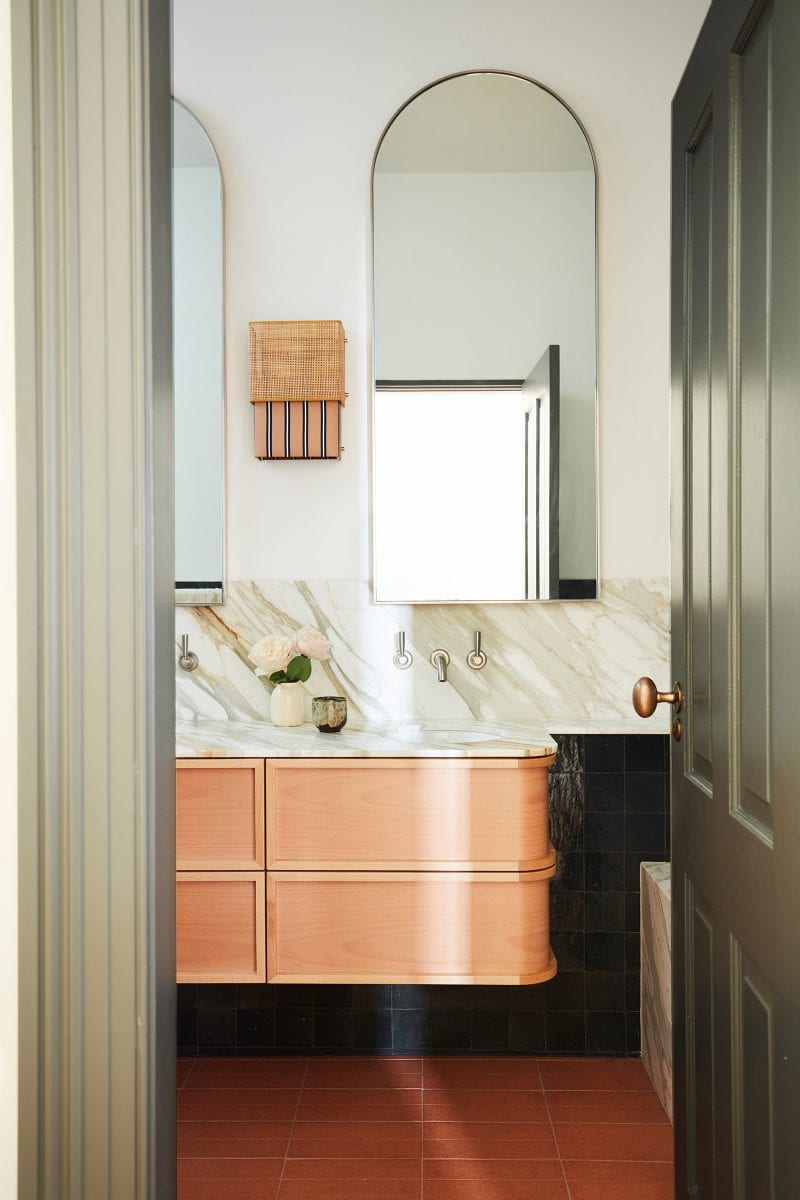
Calacatta gold by Marable, Casa handmade tiles by Onsite and terracotta floor tiles by Artedomus.
© Prue Ruscoe
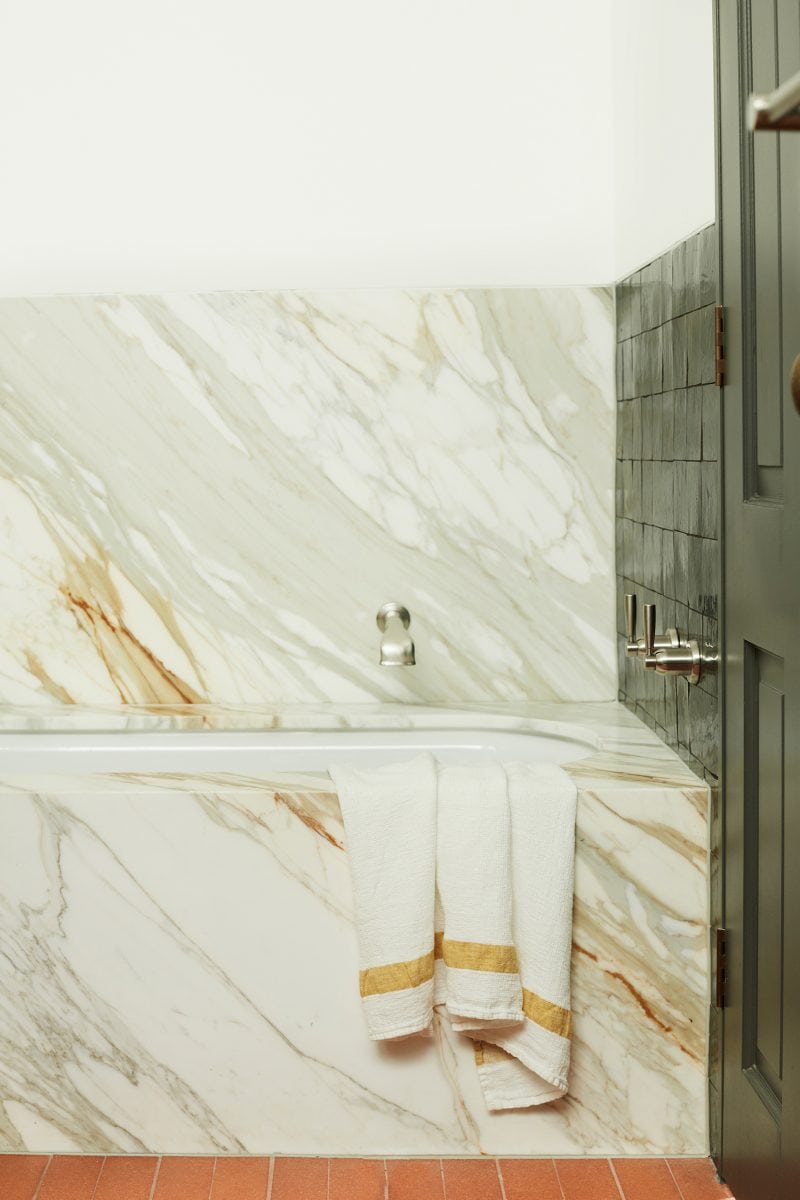
© Prue Ruscoe
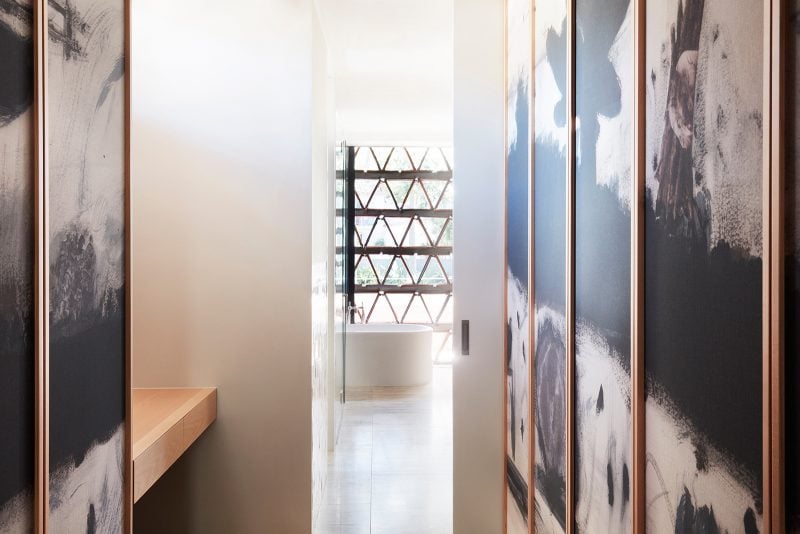
‘Woodlands’ a graphic monochrome sketch artwork created by British artist and designer, Faye Toogood, digitally transferred to hessian panels by Calico Wallpaper.
© Prue Ruscoe
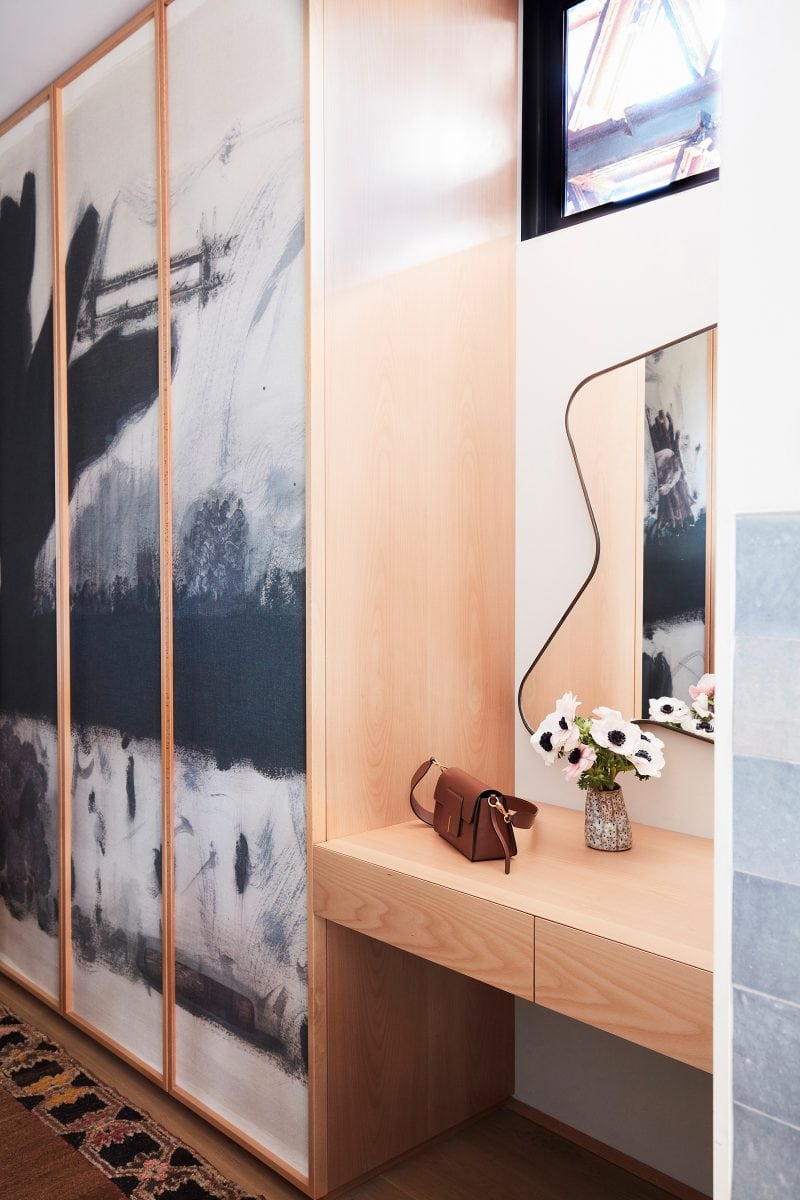
© Prue Ruscoe
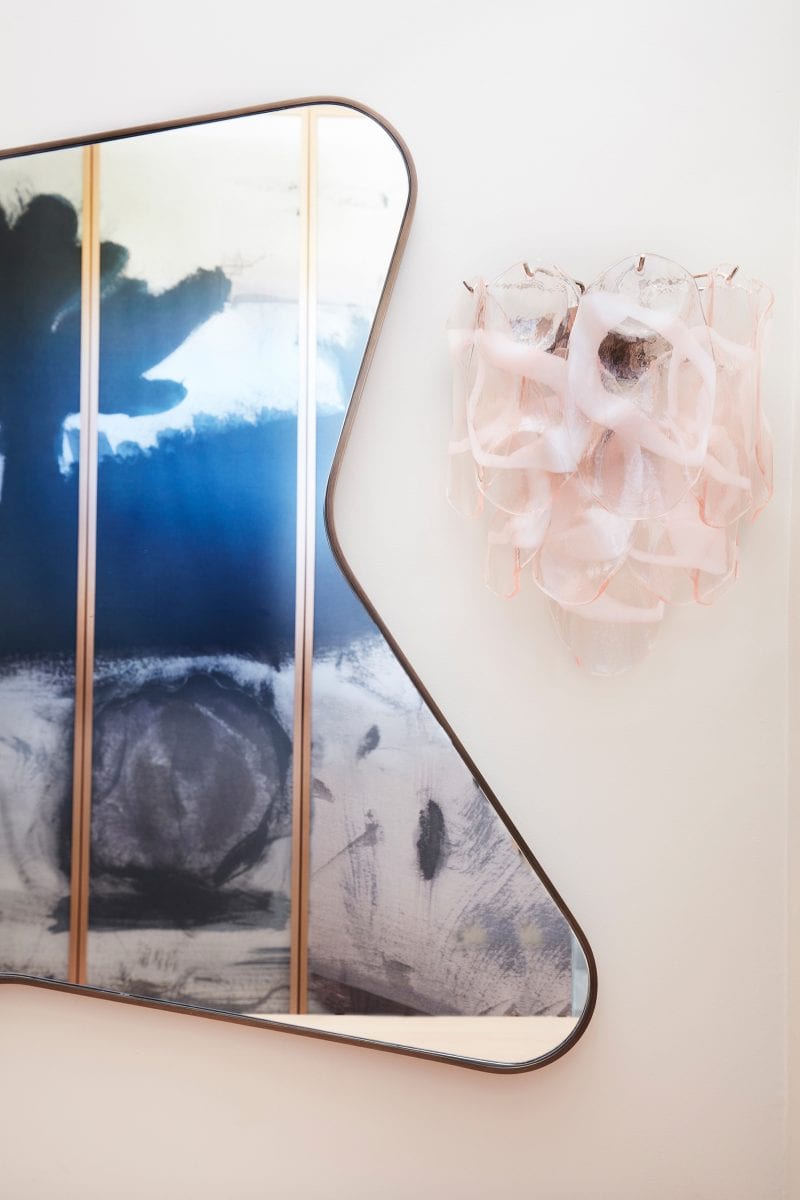
Faye Toogood’s artwork reflected in a mirror drawn by Luigi Rosselli with a loose hand, which brackets a 1970s Italian Murano light.
© Prue Ruscoe
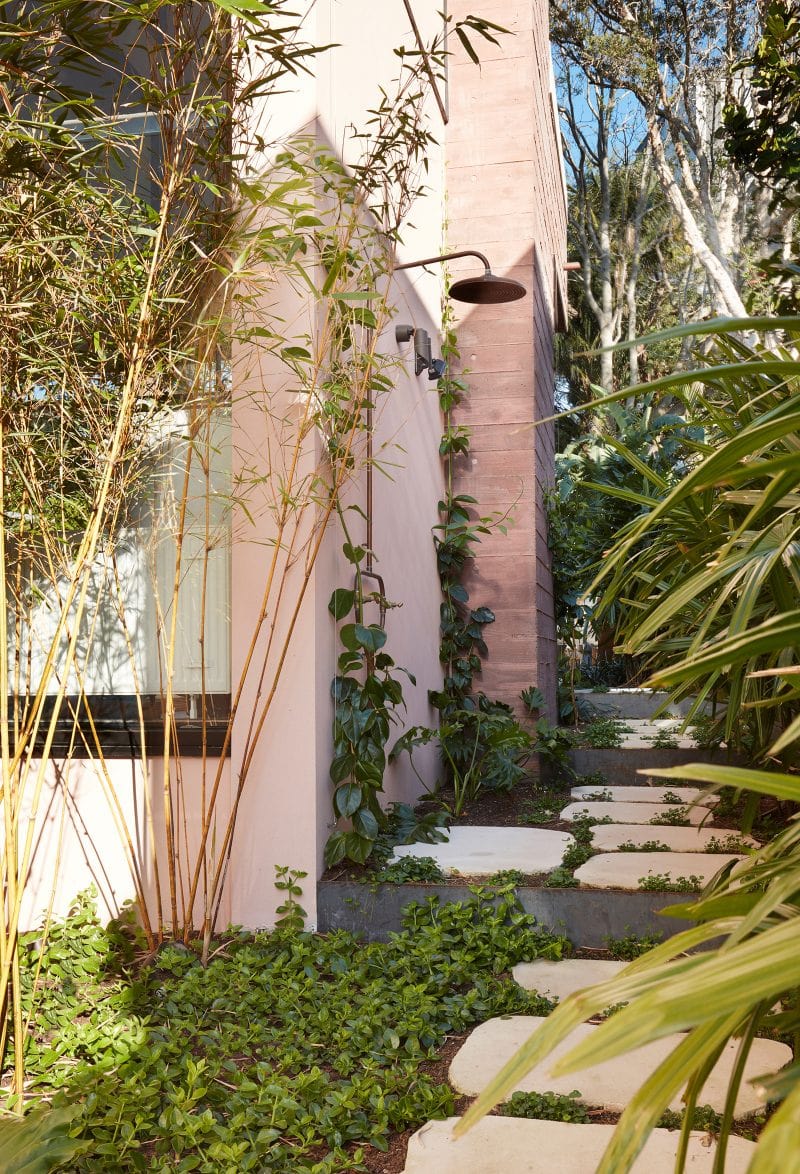
The Robert Plumb. outdoor showerhead seems very happy here with the vegetation already thriving over the pink concrete
© Prue Ruscoe
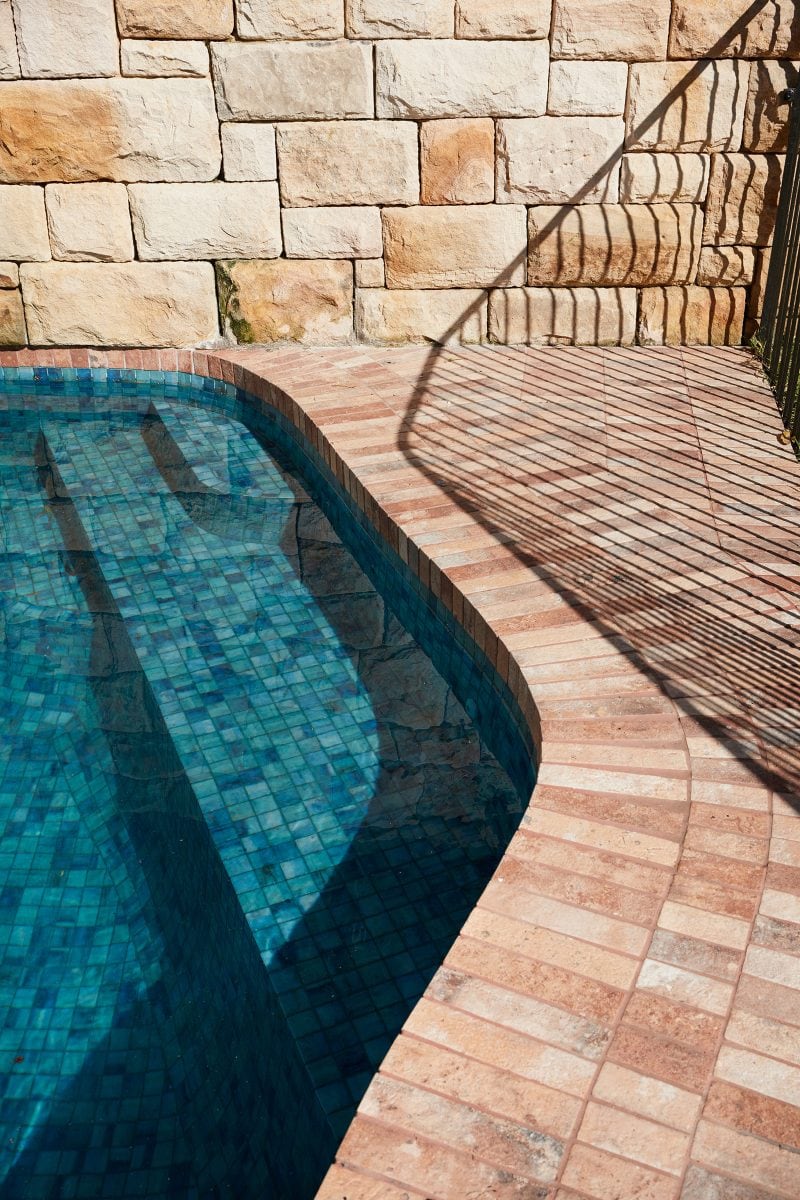
© Prue Ruscoe

The original 1980s pool was revived with a slim, mild steel balustrade, Multicolore & Tramonto Mattone pool coping tiles and Penta forest blue mosaic pool tiles supplied by Bisanna.
© Prue Ruscoe
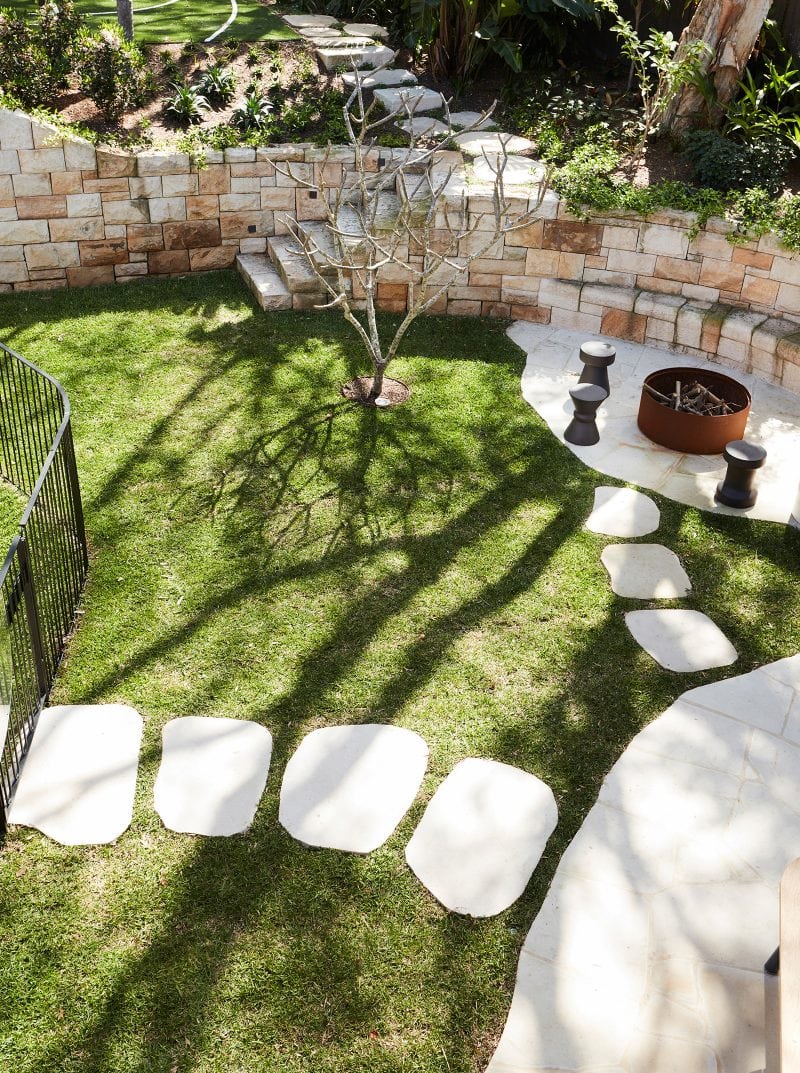
© Prue Ruscoe
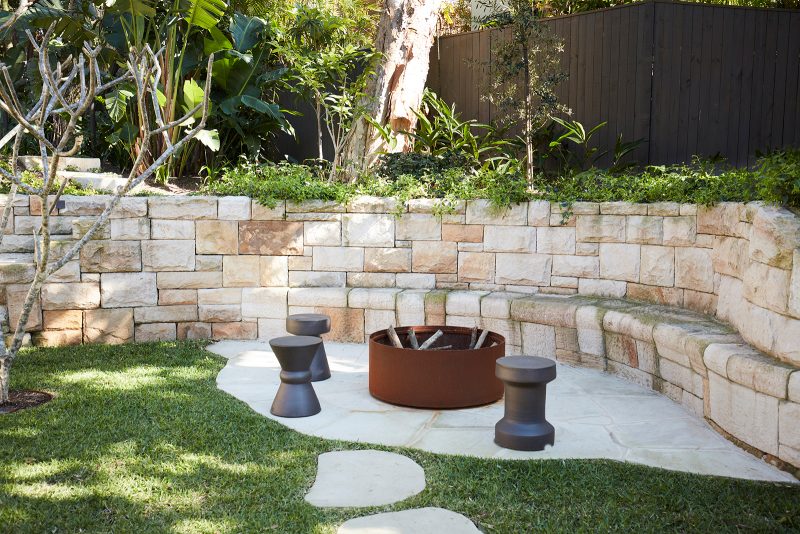
This graceful sandstone wall and bench was built by Nazih Hayek
© Prue Ruscoe
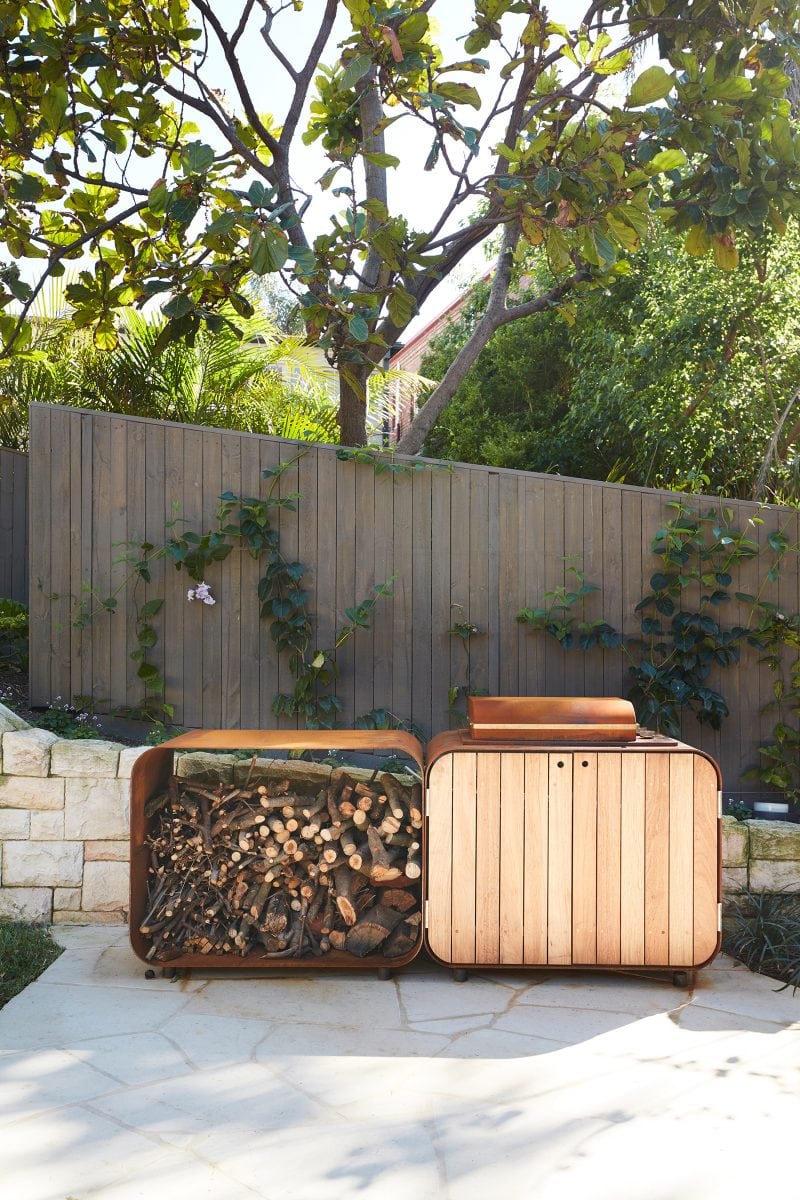
A rustic BBQ and firewood storage unit by Robert Plumb.
© Prue Ruscoe